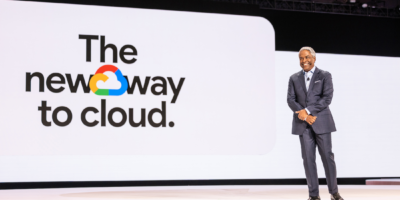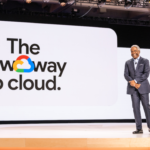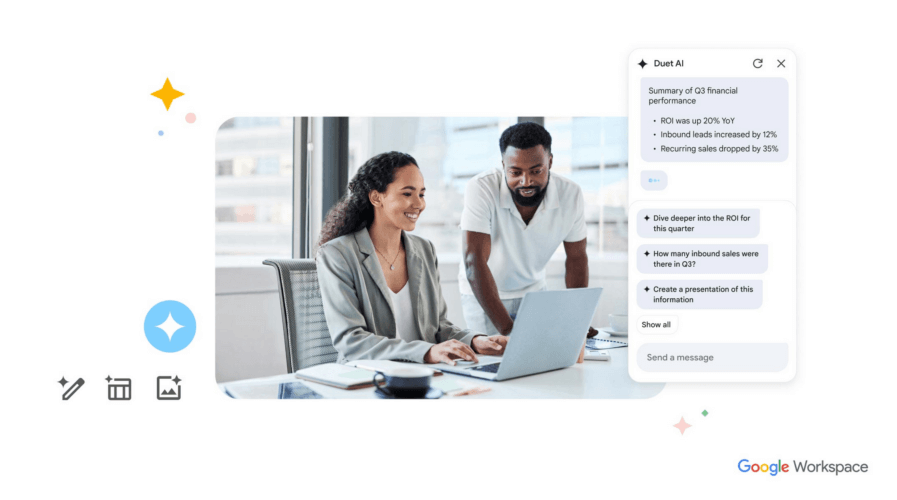
Google Workspace is now integrated with Google’s Duet AI.
Here’s how AI assistants are making work easier
- Google recently unveiled several new AI assistant features for Google Workspace.
- Google Workspace is the world’s most popular productivity tool.
- Google insists that data privacy is ensured with the new tools.
AI assistants are becoming increasingly capable of completing more tasks for users, thanks to generative artificial intelligence (AI). Initially created to help users answer queries, AI assistants have evolved into much more than that today.
AI assistants today can be segmented by product, user interface, end-user, chatbots, and smart speakers as well. Whether it’s a chatbot, text-to-speech, or speech recognition, each of these use cases brings value to organizations, especially in meeting the growing demand to serve their customers better.
In fact, according to a report by Mordor Intelligence, the intelligent virtual assistant market is expected to reach US$45.83 billion by 2028, up from US$11.13 billion in 2023. Given that deep neural networks, machine learning, and other advances in AI are enabling more virtual assistants, more use cases will only continue to be developed.
Currently, chatbots and smart speakers are two examples of virtual assistants used in retail, financial services, and healthcare, among other end-user industries. There are also AI assistants for homes, such as Alexa. AI assistants in mobile devices are becoming more capable of completing tasks, too.
For businesses, apart from chatbots, AI assistants are now becoming an important tool for meetings. Most video communication tools today, like Zoom, have speech-to-text AI embedded in them. Zoom also recently unveiled several new AI features, such as background noise suppression, high-definition audio, speech recognition, and live transcriptions and translations.

A tweet on Google AI functions on Google Workspace.
Google enhances Workspace with AI Assistants
At Google Cloud Next 2023, Google also unveiled several new AI features for Google Workspace. As the world’s most popular productivity tool, Google Workspace has over three billion users, and more than ten million paying customers. While Microsoft Office may be the godfather of productivity tools, Google continues to be a worthy competitor as it integrates Duet AI, its AI assistant, into Workspace.
“The most important part of any meeting is being clearly seen, heard, and understood, but sometimes things can get in the way, like camera and sound quality, a slow internet connection, or language barriers,” said Aparna Pappu, GM and Vice President of Google Workspace in a blog post.
“We’re putting Duet AI in Google Meet to help ensure you look and sound your best with studio look, studio lighting, and studio sound. And because sometimes it’s hard for remote participants to see everyone in the conference room, or their colleagues appear far away and out of focus, we’re rolling out dynamic tiles and face detection that give attendees in a meeting room their own video tile with their name.
“We’re also launching automatic translated captions for 18 languages; Meet will automatically detect when another language is spoken and display the translation in real time,” Pappu claimed.
Pappu also highlighted that Duet AI can capture notes, action items, and video snippets in real-time with the new “take notes for me” feature. The AI assistant will then send a summary to attendees after the meeting.
Another new feature is the ability of Duet AI to join the meeting on a user’s behalf if they are unable to do so. For example, if an employee has multiple meetings at the same time, they can prompt Duet AI not just to attend a meeting but also deliver their message and ensure they get the recap.
For a more interactive approach, users can chat directly with Duet AI. This includes asking questions about their content, getting a summary of documents shared in a space, and catching up on missed conversations.
“When you need to talk it through in real-time, you can switch to voice in an instant with huddles in Chat, right from the space where you’re already collaborating. Huddles are audio-first, impromptu gatherings powered by Meet, that help distributed teams come together in real-time without having to jump into a separate scheduled meeting.
We’re also making it easier to build larger communities across Chat, with support for up to 500,000 participants. And for those times when you need to respond to a timely email but you’re on the move, or focused on a top priority, we’re enhancing smart reply in Gmail with Duet AI, allowing you to draft longer personalized replies — with a single tap,” added Pannu.
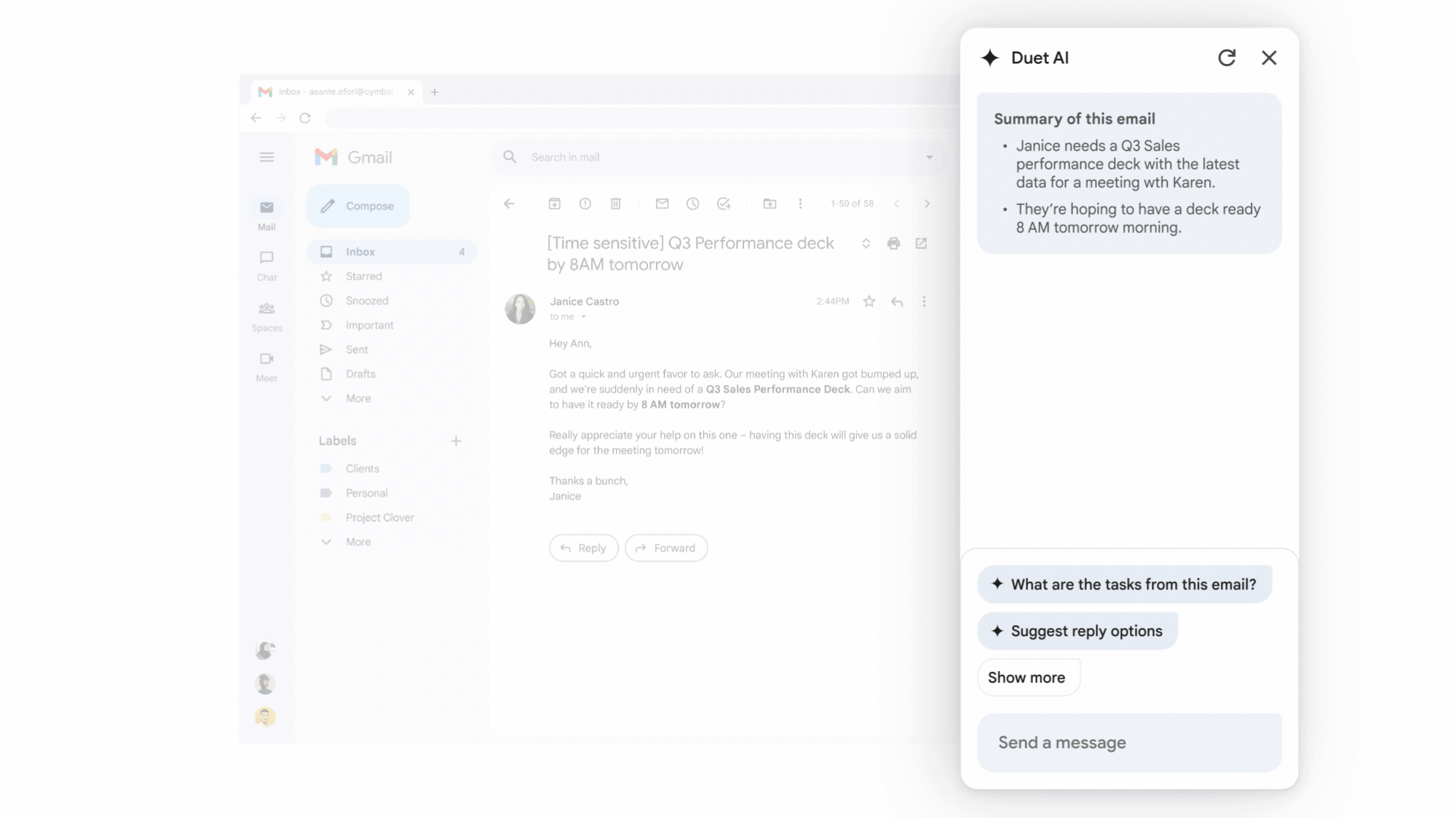
Duet AI can reduce the burden of work by generating a summary from your relevant source documents and automatically building a presentation in Slides. (Source – Google)
Will AI assistants have access to all information?
Here’s where it gets interesting. For any AI assistant to work, it needs access to the data it’s fed. Without this information, the AI will not function properly due to insufficient information.
In short, for Google’s AI assistant to complete its tasks, it will need access to all of the user’s information. This includes emails, personal messages, and such. While Google is known for doing similar things for marketing purposes, there’s a whole different level of data trust involed when it comes to accessing work emails and information.
Google has acknowledged this concern, especially with the increased use of AI almost everywhere today. Pappu told customers that user privacy and security are at the core of what Google does. Users can be assured that their interactions with Duet AI will remain private.
“No other user will see your data and Google does not use your data to train our models without your permission. Building on these core commitments, we recently announced new capabilities to help prevent cyber threats, provide safer work with built-in zero trust controls, and better support our customers’ digital sovereignty and compliance needs,” Pannu said.
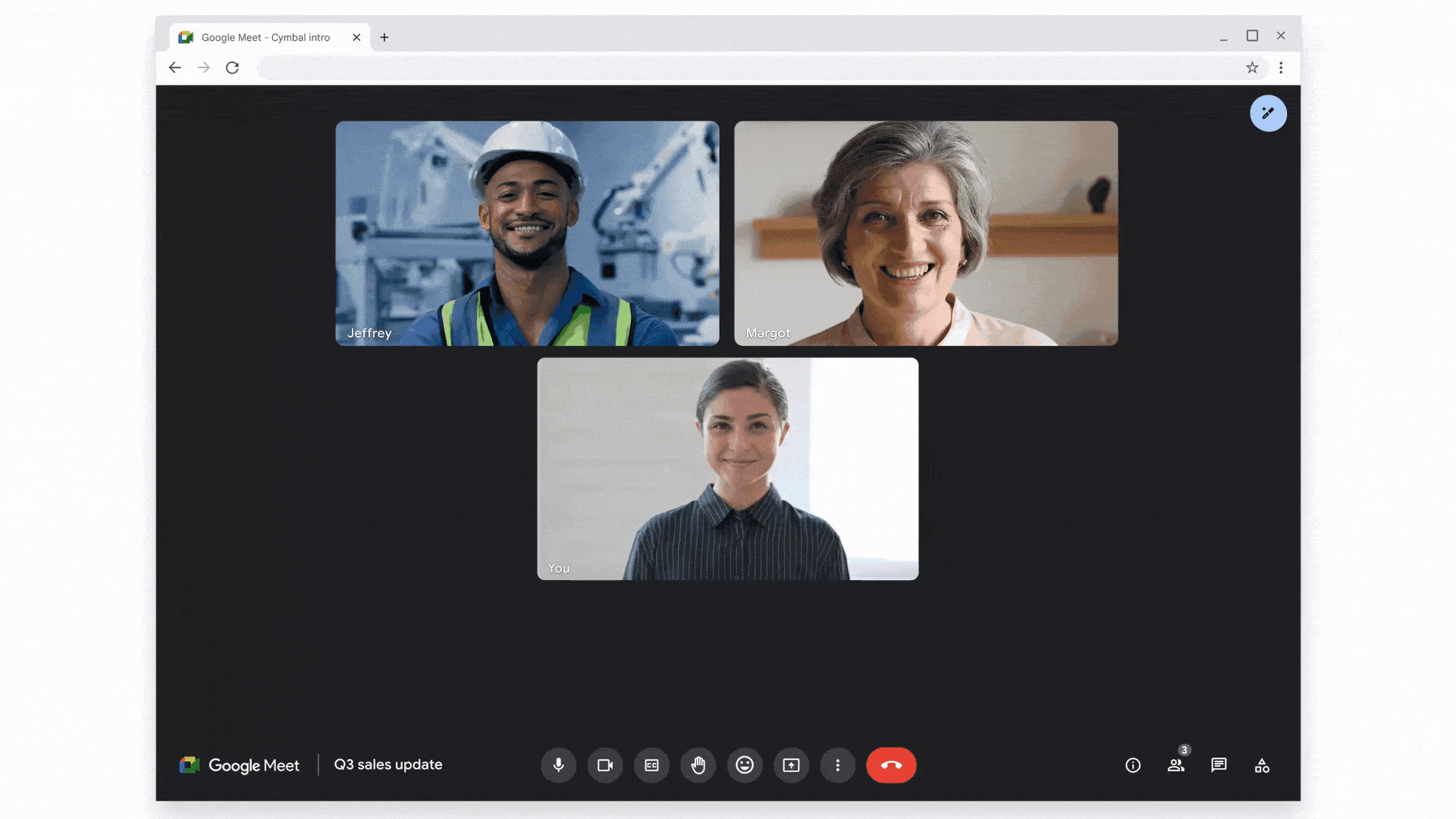
Duet AI can make your next meeting more productive with an automatically generated meeting summary and action items for you to send out as a recap to participants. (Source – Google)
A tool for tricks
As with any new technology, there will always be some who misuse it. While AI assistants have been proven to save employees time at work, there are also concerns about how these tools can be put to unethical uses. Employees could use AI assistants as a shortcut to complete tasks they are required to do.
For example, a user could use Duet AI in Google Workspace to attend a training program and summarize it instead of actually attending it. Another example would be users employing AI assistants to show that they are working, while spending time on less important tasks.
Duet AI in Workspace is just one of the many AI assistants available in the industry today. And with generative AI only expected to get better in the future, other tech companies will also develop AI assistants capable of doing a lot more tasks.
For workers, while AI assistants enable better work management, they need to be aware of the information that they’re sharing with the AI, especially when it comes to access to sensitive information. The technology may be private, but it is still capable of learning from the data to improve its delivery, something that may very well remain a concern when using AI assistants in the future.
READ MORE
- Safer Automation: How Sophic and Firmus Succeeded in Malaysia with MDEC’s Support
- Privilege granted, not gained: Intelligent authorization for enhanced infrastructure productivity
- Low-Code produces the Proof-of-Possibilities
- New Wearables Enable Staff to Work Faster and Safer
- Experts weigh in on Oracle’s departure from adland

